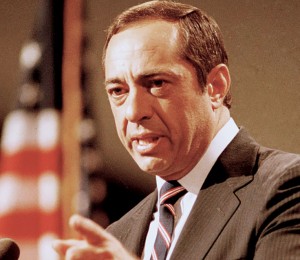by Joseph P. Tartaro | Executive Editor
Three-time New York Gov. Mario Cuomo, who served from 1983 to 1995, passed away at age 82 on New Year’s Day, the same day his son Andrew was sworn in for a second term as governor of the Empire State.
He was married to his wife, Matilda, for more than six decades, and they had five children, including Andrew and Chris Cuomo, current host of CNN’s “New Day.”
While the elder Cuomo was lionized by many in the liberal press, and especially by many in the Democrat Party, he was not the most popular political figure, especially among lawful gunowners, and his indecisiveness earned him the sobriquet of the “Hamlet on the Hudson,” especially after he twice failed to grasp an opportunity to run for the presidency of the US. A noted orator, sought after speaker, and popular liberal spokesman, the nomination and the possibility of becoming a historic figure in American government apparently never jelled for him personally.
He apparently did not like guns or gunowners, whether target shooters, hunters or private citizens concerned about their self-defense in a state that had a notoriously high crime rate during his tenure as governor, and about which he seemed unable to offer useful policies. Gunowners didn’t like him either.
In a March 1985 interview in Rochester, NY, he made the statement that people who opposed him were like “NRA members and hunters who drink beer and lie to their wives about where they had been all weekend.” Later, without withdrawing or denying his antipathy for gunowners, he termed his statement “inartful”—a non-existent word that politicians still use when they have to back away from statements they’ve made without changing the message.
The leaders of the state’s Shooters, Committee on Political Education (SCOPE, Inc.) responded by printing large metal buttons with the universal red ban stripe and the word “Cuomo,” which they sold for a $1 to help raise funds as well as express their opposition to him. The buttons became popular, and were sold with a repetition of a slogan the state used to promote its scratch-off gambling games—“All you need is a dollar and a dream.”
I recall getting on a Metro rail car wearing one of those buttons on my suit jacket after a pro-gun rally in downtown Buffalo when an elderly woman passenger with a babushka over her head asked if the button meant “No more Cuomo?” When I said that was the hoped-for purpose, she smiled broadly and said, “Good!” Before leaving the train, I gave her the button, and quite a few other passengers looked hopefully at me as if I might have more for them. And they weren’t gunowners. Apparently, even some Democrats didn’t like Mario.
And in most of the state counties west of the Hudson, even Andrew isn’t that popular a governor. He lost most of them in the 2014 election, although he had enough New York Cityvotes to edge out a win.
Mario Cuomo had many anti-gun proposals he supported, and he was an enthusiastic advocate for a ban on so-called assault weapons. He and his fellow Democrats in the Assembly majority kept trying to pass such a ban through most of his twelve years as governor but they were thwarted by opposition Republicans who controlled the state Senate.
In his last, unsuccessful run for governor, Mario Cuomo lost to Republican George Pataki who successfully pushed through the gun ban Cuomo couldn’t get.
In his obituary opinion piece after Mario died, veteran Capitol reporter Fred U. Dicker, of the New York Post, noted that he had covered “Mario Cuomo when he was New York’s secretary of state, lieutenant governor and governor for nearly 20 years, for three news organizations, and what a strange, infuriating and ultimately tragic experience it turned out to be.
“To nearly all who knew Mario Cuomo well, he was an underachieving enigma—brilliant yet indecisive, accomplished as a lawyer yet riddled with self-doubt as a politician, an initially popular governor who was eventually booted from office for failing to use that popularity to lead New York in a direction that would have made this a better state.”
Other quotes I’ve lifted from Dicker’s piece provide a broader, non-fawning retrospective on Mario Cuomo, including:
“He was someone who claimed to have foresworn political labels but was actually a quintessential political liberal and, usually, proud of it.”
“People who knew him well often joked that Mario Cuomo was someone who was ready with a question for every answer.”
“But his legacy as governor was anything but positive.”
“Gov. Mario Cuomo raised literally hundreds of state taxes to fund ever-expanding social programs and developed fiscal gimmicks, including the notorious scheme to ‘sell’ the Attica Correctional Facility back to the state to pad public revenues so he could spend even more.”
“Although he didn’t initially realize he was doing so, David Garth—Cuomo’s longtime friend and political guru, who, coincidentally, died just a few weeks ago—encapsulated Mario Cuomo’s failures as governor a few months before he was turned out of office in 1994.
“Garth was overseeing Cuomo’s bid for a fourth term and he was pressed at the Democratic nominating convention by several reporters to name some of the governor’s accomplishments during his term in office.
“After several seconds of cold silence, a clearly uncomfortable Garth responded, ‘Haven’t you seen the new rest stops on the Thruway? They’re really something’.’’





